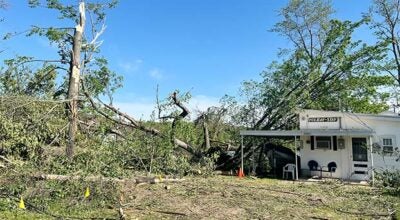Local Christmas trees keep invasive species away, ‘tiny forests’ in
Published 9:13 am Thursday, December 19, 2019
SOUTHWEST MICHIGAN — Sam Butler said buying a Christmas tree is more than a transaction. It is an experience.
Families at Butler Tree Farm, which he owns, tend to spend three to four hours at its 21515 Crane St. location near Dowagiac, purusing tree options for the right height, width and ornament-holding capacity; visiting its animal farm; and buying treats at its bake shop.
Christmas tree shopping at a local farm brings in the holiday spirit, he said, but it also keeps invasive species away.
Unrecyclable plastic Christmas trees are bad for the environment, but trees from outside the local area can be, too, said Eleanor Serocki, coordinator for SW X SW Corner Cooperative Invasive Species Management Area, based in Cassopolis.
Serocki started a small campaign promoting the purchase of local, live Christmas trees earlier this month to minimize the spread of invasive species. Yesterday, the Michigan Department of Natural Resources announced that $3.6 million in grants will be distributed for invasive species projects.
When out-of-area Christmas trees are brought into big box stores or pop-up parking lot sales, they could be bringing invasive species with them, clinging to pine needles and bark like garland. These pests could then spread to trees growing in the area, meaning a tree farm or a forest could become diseased or infested.
That makes invasive species’ negative impacts both environmental and economic, Serocki said.
The danger of transporting plants or plant parts goes past Christmas trees, too.
Like Christmas trees, wreaths and other floral holiday décor transported over a great distance could carry boxwood blight, a fungal disease dispersed by weather conditions that often kills young plants. Boxwood blight was found on Christmas trees sold by box stores last year, Serocki said.
Moving firewood over long distances for a winter campfire can spread harm in the form of oak wilt and emerald ash borers.
“The closer we drive things home, the less likely we are to bring something new in,” Serocki said.
Serocki noted that although a type of Christmas tree grown on a farm may not be native to Michigan, the trees themselves are not invasive. Customers are free to choose a tree of their preference, from blue spruce to Fraser fir.
Buying from local Christmas tree farms ensures that conifer-based habitats remain in the area, too. These landscapes support a number of species, such as birds that roost in the trees.
They become miniature forests, Serocki said, absorbing carbon and stabilizing soil.
“By choosing one of those trees, we are choosing something that has served a great life and great purpose, and for every Christmas tree that we harvest and take home and love, farmers are planting at least one tree in its place,” she said.
A tree’s capacity for habitat creation extends past the farm. If a tree is placed in a firewood pile or a brush pile after the holiday season, insects, fungi and rodents could call it home.
Naturally, buying local also helps local farmers. This is especially important given that the winter season is usually slow financially for farmers, Serocki said.
Butler, the tree farm owner, said remaining local allows him to support local businesses around him.
“I do all my shopping locally because I believe in supporting my community and keeping the money here,” he said.
Everything used in the tree business, from netting to stands to tractor tires, are all purchased as locally as can be, Butler said.
Butler Tree Farm closed earlier this week, but Butler said his tree season was busy and successful.
As boot prints of customers past embedded in dirt are covered by a light, powdery snow, the trees around them slowly grow. In the future, they may be cut and decorated, but for now, birds and other creatures sit on the tree in place of ornaments.







